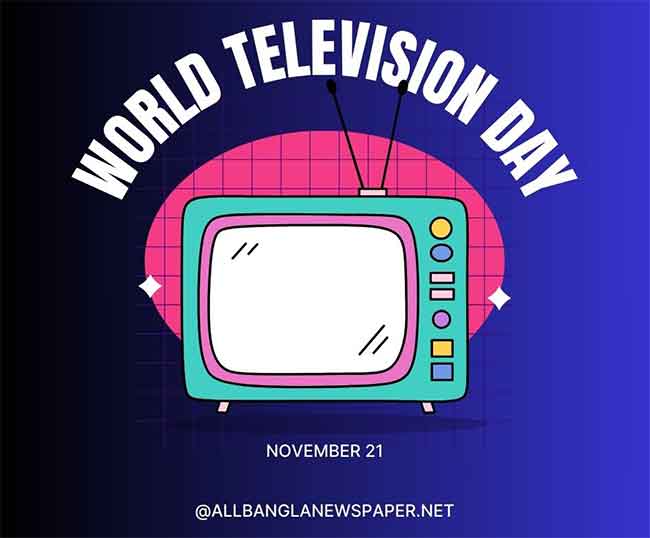
Since its inception, Television has been a transformative force in global communication, entertainment, and education. To honor its impact, World Television Day is celebrated every November 21. This day highlights Television's role in promoting information dissemination, fostering cultural exchange, and connecting people across the globe. But why is this medium so influential, and how does it continue to shape our lives in the digital age? Let's delve deeper into the significance of World Television Day and its relevance in our modern world.
The Origin and Purpose of World Television Day
The United Nations General Assembly declared World Television Day in December 1996. The date, November 21, marks the first World Television Forum held in 1996, where media leaders discussed Television's ever-growing impact on society. This day is about celebrating Television's invention and recognizing its potential to educate, inform, and inspire.
The UN acknowledged Television as a primary tool for communication, influencing public opinion and global dialogue. From covering significant world events to spreading awareness on critical issues, Television plays an essential role in shaping society.
The Evolution of Television Over the Decades
The journey of Television began in the early 20th Century, starting as a simple black-and-white device that broadcasted limited programs. Over time, technological advancements revolutionized its capabilities:
• From Analog to Digital: The shift from analog to digital Television brought sharper images, better sound quality, and more channels to viewers.
• Introduction of Color TV: The launch of color broadcasting in the mid-20th Century made television programs more engaging and lifelike, transforming how people consumed media.
• Satellite and Cable TV: These innovations expanded Television's reach to rural and remote areas, making it a ubiquitous medium.
• Streaming Services: Today, the advent of internet-based streaming platforms like Netflix and YouTube has blurred the line between Television and online media, offering viewers unparalleled convenience and variety.
Television as an Agent of Social Change
Television is more than just a source of entertainment; it is a mirror to society and a catalyst for social change. Programs addressing social issues, health awareness, and global challenges profoundly impact viewers. For example:
• Educational Programs: Channels like National Geographic and Discovery Channel have introduced millions to science, history, and culture.
• Awareness Campaigns: Television has been instrumental in spreading awareness about critical issues like climate change, gender equality, and public health.
Furthermore, Television is a reliable medium for real-time updates and safety information during global crises such as natural disasters or pandemics.
Cultural Exchange Through Television
Television bridges cultural gaps by introducing audiences to different traditions, lifestyles, and perspectives. From international cooking shows to documentaries on world heritage sites, it fosters mutual respect and understanding among diverse communities.
The broadcasting of international sports, such as the Olympics or FIFA World Cup, unites millions worldwide, transcending language and cultural barriers. This power to connect and unify is one of the most celebrated aspects of Television.
World Television Day and the Digital Era
In the digital era, where smartphones and social media dominate, you might wonder if Television still holds its ground. The answer is a resounding yes. Television remains a central part of households, offering curated, professional content with unmatched reliability.
• Credibility: Television channels are perceived as more credible information sources than unverified social media platforms.
• Live Events: Television is unparalleled in its ability to broadcast live events, whether breaking news or a sports match.
• Shared Viewing Experiences: Watching Television continues to be a social activity, bringing families and friends together.
Moreover, modern televisions now come with intelligent features, integrating streaming services and internet access, ensuring they remain relevant in a tech-savvy world.
Television's Role in Celebrating International Days
World Television Day coincides with other international observances, like International Men's Day. This overlap highlights how Television plays a role in spreading awareness and celebrating diverse themes such as "International Men's Day Importance and Celebration." With dedicated programs and documentaries, Television ensures that significant occasions receive the attention they deserve.
Challenges Facing Television in the 21st Century
Despite its undeniable influence, Television faces challenges in the age of digital disruption:
• Competition from Streaming Services: Platforms like Netflix, Amazon Prime, and Disney+ draw audiences away from traditional TV channels.
• Declining Advertisements: Television networks struggle to maintain revenue with the rise of targeted online ads.
• Evolving Viewer Preferences: The younger generation prefers on-demand content over scheduled programming.
Television networks are adopting hybrid approaches, integrating online platforms and social media into their strategies to stay relevant.
The Future of Television
Television's adaptability will be critical to its survival as we look to the future. Some potential trends include:
• Interactive TV: Integrating interactivity, such as voting during live shows, will engage audiences more effectively.
• Personalized Content: AI algorithms may curate programs tailored to individual preferences.
• 4K and 8K Resolution: As technology advances, ultra-high-definition visuals will become the norm.
Television's core purpose—educating, entertaining, and connecting—will remain intact even with these changes.
How to Celebrate World Television Day
Celebrating World Television Day can be a fun and reflective experience. Here are a few ideas:
• Watch a Documentary: Choose a program that educates and broadens your horizons.
• Revisit Classic Shows: Dive into nostalgia by watching timeless classics.
• Discuss Its Impact: Discuss how Television has influenced your life or society.
• Support Local Channels: Show appreciation for regional content representing local cultures and traditions.
World Television Day is more than a celebration of a device; it's a tribute to the stories, ideas, and knowledge shared across screens worldwide. Television remains a powerful medium that informs, educates, and entertains millions daily, shaping public opinion and fostering global dialogue.
As we commemorate this day, let us reflect on how Television has enriched our lives and continues to do so in the digital era. It's not just about the past; it's about imagining how Television will evolve and maintain its vital role in connecting the world.
#WorldTelevisionDay #Television'sRoleInSociety #TelevisionEvolution





